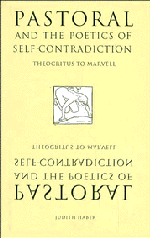Book contents
- Frontmatter
- Contents
- Acknowledgments
- Texts and abbreviations
- Introduction: “Remedies themselves complain”: pastoral poetry, pastoral criticism
- 1 Bringing it all back home: bucolic and heroic in Theocritus' Idylls
- 2 Si numquam fallit imago: Virgil's revision of Theocritus
- 3 Pastime and passion: the impasse in the Old Arcadia
- 4 Complaints themselves remedy: Marvell's lyrics as problem and solution
- Epilogue Farewell to pastoral: The Shepherd's Week
- Notes
- Works cited
- Index
4 - Complaints themselves remedy: Marvell's lyrics as problem and solution
Published online by Cambridge University Press: 17 August 2009
- Frontmatter
- Contents
- Acknowledgments
- Texts and abbreviations
- Introduction: “Remedies themselves complain”: pastoral poetry, pastoral criticism
- 1 Bringing it all back home: bucolic and heroic in Theocritus' Idylls
- 2 Si numquam fallit imago: Virgil's revision of Theocritus
- 3 Pastime and passion: the impasse in the Old Arcadia
- 4 Complaints themselves remedy: Marvell's lyrics as problem and solution
- Epilogue Farewell to pastoral: The Shepherd's Week
- Notes
- Works cited
- Index
Summary
By the seventeenth century, the severing of pastoral connections that began in the early Renaissance appears to be complete. The interest in the lyric form during this period coincides with the development of a version of pastoral that is more self-reflexive, internalized, and metaphoric – a thoroughly self-conscious, “sentimental” pastoral that is epitomized by the poetry of Andrew Marvell. The problems that are posed by all of Marvell's pastorals appear in their most concentrated form in his Mower poems; Rosalie Colie comments: “Pastoral is cruelly intellectualized in these poems – and to intellectualize is radically to invert pastoral values in any case, which frankly relinquish intellectual burdens for the embrace of a comfortable natural passivity.” Colie's assessment clearly involves a radical oversimplification: she is ignoring the extent to which pastoral poetry has always been intellectualized, has always contained elements that seem antithetical to it. Nevertheless, we can appreciate the force of her insight: Marvell so insistently magnifies these elements in the Mower poems, and so consistently suppresses their opposites, that the ideals we traditionally associate with pastoral seem irretrievably lost. The condition of the inhabitants of these lyrics – and of their creator – approximates that of Sidney's courtiers; the self-enclosed self-division that Sidney feared seems fully realized here. But Marvell sees disjunction itself as the means of establishing continuity, and his apparent movement away from traditional bucolic values is, in fact, a movement back: he is self-consciously reinventing the paradoxical relationship of separation and connection upon which the classical pastoralists relied.
- Type
- Chapter
- Information
- Pastoral and the Poetics of Self-ContradictionTheocritus to Marvell, pp. 98 - 152Publisher: Cambridge University PressPrint publication year: 1995



